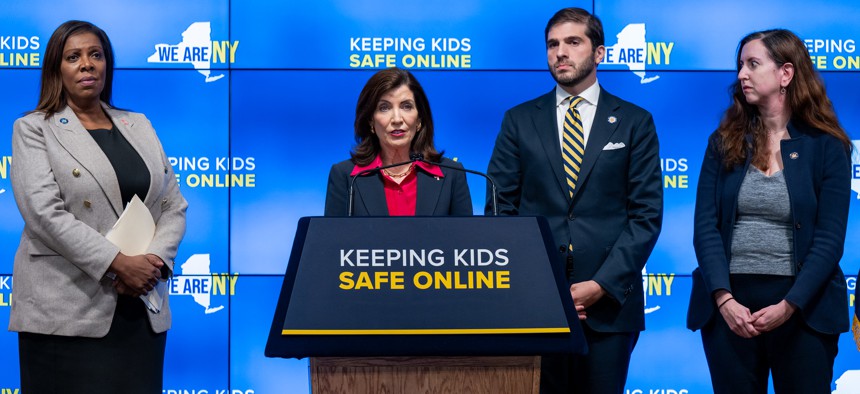Policy
Legislation filed in New York regulating minors’ social media use
Florida passed similar legislation earlier this year.

Gov. Kathy Hochul, state Attorney General Letitia James, state Sen. Andrew Gounardes and Assembly Member Nily Rozic announced two bills related to minors' social media usage during a press conference on Oct. 11, 2023. Susan Watts/Office of Governor Kathy Hochul
Gov. Kathy Hochul and state Attorney General Letitia James joined with state Sen. Andrew Gounardes and Assembly Member Nily Rozic on Wednesday to announce new legislation meant to protect children on social media.
If the bills pass, it would make New York a leader in placing restrictions on how the tech industry interacts with kids online, but they may not survive legal scrutiny; a federal court has already halted a similar law in California from taking effect.
A search of bills already submitted for the 2024 legislative session in Florida, which begins Jan. 9, shows no similar legislation has yet been filed. But Florida lawmakers and Gov. Ron DeSantis did OK an online security bill (HB 379) earlier this year that requires school districts to create "internet safety policies."
Among its provisions, the new Florida law "prohibit(s) and prevent(s) students from accessing social media platforms" while at school, bans the use of TikTok outright, and "requires students in grades 6 through 12 to receive instruction on the social, emotional, and physical effects of social media," a staff analysis explained.
The first of the two Empire State laws, dubbed the New York Child Data Protection Act, is an updated version of a bill of the same name that Gounardes and Rozic first introduced last year. It would prohibit social media companies from collecting and selling the personal information of anyone under the age of 18 for advertising purposes without their express informed consent.
For kids under 13, a parent would need to offer their consent. According to Gounardes, the new version of the bill does not differ greatly from the old one, but it has become more targeted.
“What we have found, as we've done more homework and more digging in this, is that it's really about the ability of the companies to collect the data and then sell the data that's highly problematic,” he told City & State. “Which is why we are basically refocusing the bill on those aspects because that's where the greatest arm lies.”
The second bill, called the Stop Addictive Feeds Exploitation (SAFE) for Kids Act, is new legislation that would curb addictive features like curated algorithmic feeds on social media for kids under 18.
Specifically, it would require that users under 18 years old only have access to chronological feeds made up of only accounts that a user specifically follows, unless a parent has given their consent to opt in to the additional algorithmic features.
“Knowing how dangerous these algorithms are, I will not accept that we are powerless to do anything about it,” Hochul said, citing studies and statistics that show the negative mental health impacts of excessive social media use fueled by features meant to keep users on for longer. She said that the algorithms that push content at minors represent a health risk akin to cigarettes or alcohol.
Similar laws aimed at protecting kids online have faced legal roadblocks and opposition from big tech companies and some civil liberties groups.
A federal court in September issued an injunction on the behalf of tech companies that blocked the implementation of a California law that prevents social media companies from collecting and selling data from minors, similar to the first of the two new bills.
The judge in the case said that the law likely violates the First Amendment, the latest ruling in a string of rulings that have blocked other laws intended to protect kids online.
“This bill was specifically tailored, obviously, to address a number of the issues that have been brought up and we know that in a number of other states, legislation has been challenged,” James said.
She added that the two bills are narrower in their scope than other bills and will not block anyone from accessing social media. “That is why I am confident this will pass constitutional muster,” James said.
Already, the proposed legislation is facing some scrutiny from the tech industry.
“Protecting children’s safety online is a goal that Tech:NYC and each of our member companies share,” Tech:NYC Julie Samuels said in a statement. “In pursuing this goal, however, we must not sacrifice user privacy or First Amendment rights, which these proposals would inadvertently risk doing.”
She warned that age verification could require even more personal data from children and their parents, an issue that came up in the California case, and urged James to find a “common best practice” for age verification that maintains users’ privacy.
The earlier version of the NY Child Data Protection Act – which was not introduced in collaboration with the office of the attorney general – also attracted opposition from the Surveillance Oversight Technology Protect, which dubbed it the “NY Surveillance Act.” The anti-surveillance group has argued that requiring websites to treat minors and adults differently will force them to use highly invasive and unreliable age verification software.
Gounardes dismissed such arguments. He said major tech companies already require users to give their birthday when signing up for accounts and collect so much data that they already have all the information needed to verify users’ ages.
“They know what you had for breakfast before you even decided what you want for breakfast,” he said. “They know where you are to a block, they know your age, they have all this information already.”
Moreover, James said that tech companies already have mechanisms to determine users’ ages and the legislation would merely require those companies to act on that information.
Jim Rosica contributed. A version of this story was first published on City & State New York.
NEXT STORY: Abortion amendment supporters raise over $4 million